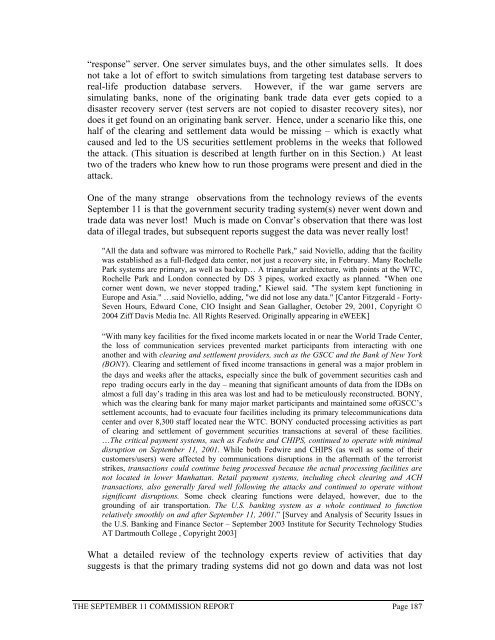September 11 Commission Report - Gnostic Liberation Front
September 11 Commission Report - Gnostic Liberation Front
September 11 Commission Report - Gnostic Liberation Front
Create successful ePaper yourself
Turn your PDF publications into a flip-book with our unique Google optimized e-Paper software.
“response” server. One server simulates buys, and the other simulates sells. It does<br />
not take a lot of effort to switch simulations from targeting test database servers to<br />
real-life production database servers. However, if the war game servers are<br />
simulating banks, none of the originating bank trade data ever gets copied to a<br />
disaster recovery server (test servers are not copied to disaster recovery sites), nor<br />
does it get found on an originating bank server. Hence, under a scenario like this, one<br />
half of the clearing and settlement data would be missing – which is exactly what<br />
caused and led to the US securities settlement problems in the weeks that followed<br />
the attack. (This situation is described at length further on in this Section.) At least<br />
two of the traders who knew how to run those programs were present and died in the<br />
attack.<br />
One of the many strange observations from the technology reviews of the events<br />
<strong>September</strong> <strong>11</strong> is that the government security trading system(s) never went down and<br />
trade data was never lost! Much is made on Convar’s observation that there was lost<br />
data of illegal trades, but subsequent reports suggest the data was never really lost!<br />
"All the data and software was mirrored to Rochelle Park," said Noviello, adding that the facility<br />
was established as a full-fledged data center, not just a recovery site, in February. Many Rochelle<br />
Park systems are primary, as well as backup… A triangular architecture, with points at the WTC,<br />
Rochelle Park and London connected by DS 3 pipes, worked exactly as planned. "When one<br />
corner went down, we never stopped trading," Kiewel said. "The system kept functioning in<br />
Europe and Asia." …said Noviello, adding, "we did not lose any data." [Cantor Fitzgerald - Forty-<br />
Seven Hours, Edward Cone, CIO Insight and Sean Gallagher, October 29, 2001, Copyright ©<br />
2004 Ziff Davis Media Inc. All Rights Reserved. Originally appearing in eWEEK]<br />
“With many key facilities for the fixed income markets located in or near the World Trade Center,<br />
the loss of communication services prevented market participants from interacting with one<br />
another and with clearing and settlement providers, such as the GSCC and the Bank of New York<br />
(BONY). Clearing and settlement of fixed income transactions in general was a major problem in<br />
the days and weeks after the attacks, especially since the bulk of government securities cash and<br />
repo trading occurs early in the day – meaning that significant amounts of data from the IDBs on<br />
almost a full day’s trading in this area was lost and had to be meticulously reconstructed. BONY,<br />
which was the clearing bank for many major market participants and maintained some ofGSCC’s<br />
settlement accounts, had to evacuate four facilities including its primary telecommunications data<br />
center and over 8,300 staff located near the WTC. BONY conducted processing activities as part<br />
of clearing and settlement of government securities transactions at several of these facilities.<br />
…The critical payment systems, such as Fedwire and CHIPS, continued to operate with minimal<br />
disruption on <strong>September</strong> <strong>11</strong>, 2001. While both Fedwire and CHIPS (as well as some of their<br />
customers/users) were affected by communications disruptions in the aftermath of the terrorist<br />
strikes, transactions could continue being processed because the actual processing facilities are<br />
not located in lower Manhattan. Retail payment systems, including check clearing and ACH<br />
transactions, also generally fared well following the attacks and continued to operate without<br />
significant disruptions. Some check clearing functions were delayed, however, due to the<br />
grounding of air transportation. The U.S. banking system as a whole continued to function<br />
relatively smoothly on and after <strong>September</strong> <strong>11</strong>, 2001.” [Survey and Analysis of Security Issues in<br />
the U.S. Banking and Finance Sector – <strong>September</strong> 2003 Institute for Security Technology Studies<br />
AT Dartmouth College , Copyright 2003]<br />
What a detailed review of the technology experts review of activities that day<br />
suggests is that the primary trading systems did not go down and data was not lost<br />
THE SEPTEMBER <strong>11</strong> COMMISSION REPORT Page 187







